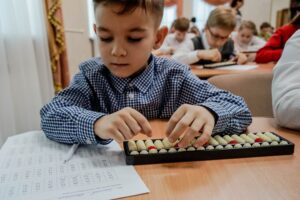What to do if lessons are boring, too difficult or too easy
It’s frustrating when a child doesn’t understand or want to learn his or her native language. Mathematics, unfortunately, for many students too, turns from a fun activity into a dull routine. How can you help your child overcome difficulties and fall in love with basic subjects? In this article, we have collected the most important tips and principles studies add 3 single digit numbers.
How to love math
Solve ancient and non-standard problems
Mathematics is one of the oldest ways to learn to think. People packed their discoveries into cosine formulas, Pythagorean pants, and axioms to make it easier for the next generations. Today, arithmetic often comes down on the child in the form of subtraction examples, multiplication tables, and rules to memorize. With this approach, the student does not see a problem that can be solved with the skills learned. Doing this kind of math is boring, but there is another.
To awaken interest in the adding by 1, you need to show the child how the first mathematical problems arose and were solved. Collections of Olympiad problems will do.
Put knowledge into practice
Another way to make schoolchildren friends with math is to involve them in household chores. If you plan to renovate a room, ask your child to calculate the amount of wallpaper or floorboard needed. In the kitchen, ask them to count the number of ingredients if they plan to make half or three times as many pancakes. Solving the abstract problem of 1 kg 200 grams of flour is boring, and measuring by yourself and understanding that grams and milliliters do not match including adding by 2 is much more interesting.
Paradoxically, many schoolchildren have no idea about the measures of length, volume and weight. Ask your child to show you 1 centimeter and 1 meter with his hands. Ask how many meters the kitchen in your house is, how much a bag of potatoes or a package of pasta weighs. Most likely, the child will be wrong in estimating the volume of the mug from which he or she drinks tea every day. Let your child move these concepts from being abstract to concrete, tangible quantities. This will help your child continue to study chemistry, physics, geometry, and algebra.
